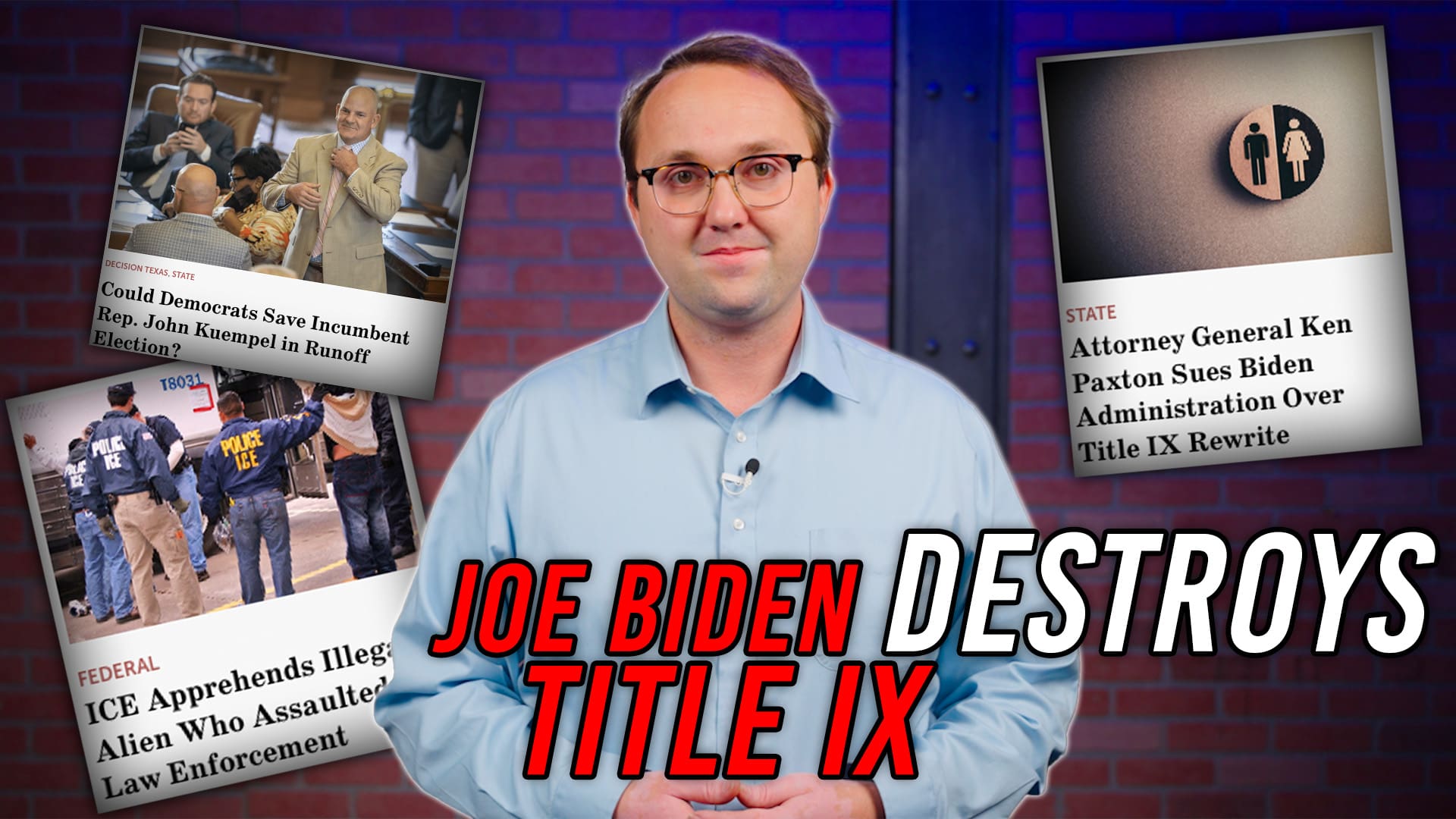***Editor’s note: This article was written prior to Amy Hedtke’s decision to enter the race for Texas GOP chair, which was after our deadline for candidates to return our questionnaire.***
As Republicans convene at their convention this July, delegates will choose between two individuals to lead the party into the 2020 election and beyond: James Dickey and Allen West.
Incumbent James Dickey is the former chairman of the Travis County GOP. He was elected to helm the party by the SREC in 2017 and was re-elected at the 2018 convention. He continues to reside in Austin, Texas.
Allen West is a retired U.S. Army lieutenant colonel and served a term in Congress, representing South Florida before moving to North Texas in 2014.
Texas Scorecard reached out to both candidates and provided them with a questionnaire that included items we believe are important for Texas Republicans. Each of them responded, and we published their unedited remarks for the public.
While this organization does not endorse in party contests, we once again made a questionnaire available to both candidates, and their remarks can be viewed here. The election for RPT chairman will be decided by delegates at the Texas GOP’s state convention this July.
Here are their responses without edits:
What are the qualities of a Texas Republican, and why are you one?

James Dickey: The qualities of a Texas Republican are outlined in our Preamble and Party principles, which include a belief in God, strict adherence to the plain language of the Constitution, the belief in the sanctity of life, traditional marriage, and personal responsibility. My parents raised me in a home that modeled these beliefs and principles, and I adopted them as my own at a young age and ended up volunteering for my first Republican campaign in 1984.

Allen West: The qualities of a Texas Republican are about understanding what liberty and freedom is all about, understanding the relationship, that the individual is sovereign over the institution of government, which is the reason why Texas was founded against tyranny and despotism. But I don’t think it’s about being just a Texas Republican, I think it’s about being a Republican period, and I think Texas should be leading the way when it comes to understanding conservative principles and values, and the right relationship between the individual citizen, and the institution of government.
I’ve always been a Republican. I took an oath to the Constitution, and I took an oath to defend our freedoms and liberties, and I think the most important thing is what you profess as your values, what you profess as your understanding of conservatism, and the true realization that the individual is sovereign.
Texas has a lot of elected Republican officials. Who do you believe does the best job of standing up for the priorities of the Texas GOP? Why?
JD: While I have had the pleasure of working with many elected Republican officials, my greatest joy has been working alongside many of our SREC members as we have fought together for our Party’s priorities. They represent the grassroots and are willing to take a stand for what is right, even when it is not popular.
AW: When you look at people such as Representative Kyle Biedermann, he has done a fantastic job. He’s fearless, and he has taken the right kind of stance, and so has Senator Bob Hall, on these issues. I would say that those are two stalwarts, and everyone else that follows in that mindset, that scheme, those are the type of individuals that we want to see here in Texas. The most important thing in Texas is that we need to have elected representatives that understand you don’t need to be a lesser version of the other side, and we don’t need to try to acquiesce, appease, and compromise to a philosophy of governance that is the antithesis of what Texas stands for.
What current Republican official has done the most damage to the Texas GOP brand? Why?
JD: Any time a Republican official does not live up to our principles, they do damage to our Party’s brand. Trust must be maintained between the voters and those they elect to office. No office holder is perfect, and thankfully voters have the power to reject or reward our Republican representation in Congress, the Texas Legislature, and our Statewide office holders.
AW: That’s an easy response; that’s the disgraced Speaker of the House, Dennis Bonnen, because he’s a person who lacks honor, integrity, and character. The fact that he’s still in that position and has not been condemned by the Governor, Lt. governor, or anyone in other leadership positions, that’s not a good reflection of what we should see in leadership here in the great state of Texas. So, I think he damages the brand. I think that as long as he stays in that position, even after he said he’s not going to run for reelection, he should not be in a leadership position. He should not be trusted as such.
Is Karl Rove an asset or a liability for the Texas GOP? Why?
JD: Karl Rove was instrumental in launching and seeking the funds for the largest single volunteer engagement program in Republican Party of Texas history, which has now yielded the Republican Party of Texas its most successful voter registration drive, not just in RPT history, but in the nation.
AW: You know I think it’s very interesting that the week following when I said I was going to have an exploratory committee to look at becoming the next chairman of the Republican Party of Texas, I received a phone call from Mr. Rove, and he somewhat berated me about pursuing the opportunity to be chairman of the Republican Party of Texas. To me, that tells me everything I need to know because why wouldn’t the Republican Party of Texas seek to expand? Why wouldn’t it want to have a challenge to leadership and look at different perspectives, views, and insights. I think that what Karl Rove has done, more so is his own self-advancement, concerned more with his control within the Republican party in Texas, rather than thinking about the future of the Texas Republican Party.
There’s an old guard within the Republican party period, all across the United States of America. It is very concerned with the rise of a new vanguard, a principled vanguard, and that is going to keep holding this party back, so Karl Rove has done more to hurt this Republican Party of Texas, regardless of the amount of money that he’s giving, because the amount of money that he’s giving is only going towards his own agenda.
While the “Blue Wave” wasn’t successful in taking out Sen. Ted Cruz, a lot of Texas Republicans lost their elections that year. Why did that happen?
JD: In 2018, the O’Rourke campaign provided hundreds more staff and thousands more volunteers than the Republican campaigns had. They also trained their voters to vote straight party Democrat at a level that hadn’t been seen previously. Several of our down ballot races were greatly impacted by those two factors.
AW: A lot of Texas Republicans lost their elections in 2018 because we didn’t have a strong message. It’s one thing to go out and say that you’re going out and getting people to register to vote; the more important thing is whether you’re motivating people to vote. We saw a Robert Francis O’Rourke wave of momentum that came through and we didn’t do anything to practically undermine it.
He was a horrible candidate, and we did not articulate that, and we allowed him to define himself and the political battles that took place. We’ve got to do a better job of putting the progressive socialists on defense, and we did not do that in 2018, and if we fail at that again in 2020, we could see even more losses. We are too close, with only nine seats being needed for Democrats to take the Texas House, and it’s a possibility.
What does the Texas GOP need to do to win back these seats in 2020?
JD: Immediately after the 2018 election, the team at the Republican Party of Texas and I, in coordination with many others, developed a plan to win in 2020. First we needed to increase the pool of Republican voters in the state by registering more likely voters, and we have thus far succeeded in this RPT initiative by registering 89,070 new Texas Republicans within the first year.
More importantly, we decided our emphasis in that effort would be to do it with volunteers, giving us a volunteer army ready and able to help our candidates in the 2020 election. Again, we have succeeded by recruiting over 3,600 new Texas volunteers through that effort. Then we needed to recruit more candidates all across the state in as many races as possible because you lose one hundred percent of the races in which you do not fight. We launched the first-ever Candidate Recruitment Task Force, and as a direct result of those efforts we currently have 2,118 Republican candidates on the ballot in races across Texas, compared to the Democrats with only 837. Then we planned a field program that put more staff on the ground, earlier in an election cycle, than RPT has ever had, and there is much more to come.
We provided resources and tools to candidates that would help them save money in their campaign and increase their access to, and ability to use, the best data we have ever provided. These efforts and this plan – combined with great candidates – is what delivered victory in December in two Houston at-large city council races, and in Fort Bend county in January in House District 28 where we increased a 2018 win of 8% to a 2020 win of 16%, in spite of all the Democrats’ national money, endorsements, and efforts. Our team is laser-focused on winning in November, and together, we will keep Texas red!
AW: The important thing the Texas GOP has to do, is come out with a strong message, a message that delineates why Texas is successful, and those principles, policies, values, opportunities, and the reason why so many people are fleeing from failed economic states like California, Illinois, New York, and New Jersey, are coming to Texas. We have to remind them consistently, as to why they left, and as to why those Texas values and principles are superior, so that they don’t look back and vote as if they were still in those places.
The other thing the Texas Republican Party has to do is reconnect with the minority communities, especially the Black and Hispanic communities in the major population centers, because they are conservative in nature. We aren’t doing a good job of that, and we need to talk to the Black and Hispanic conservatives in these areas, and they don’t get the support and they don’t get the resources. We cannot continue to surrender territory to the left, because that’s the same thing that caused the state of Virginia to flip, Washington, Nevada, Arizona, Colorado, New Mexico, and it’s coming here to Texas.
The Left is taking over the major population centers. It’s a numbers game, and if we cannot motivate a high percentage of turnout in the rural areas, we cannot afford anything less than 75-80% turnout. We have to do that battlefield calculus that enables us to find those votes and find those precincts, and we can pick up new voters in the major population centers.
Why should Republicans choose you for party chairman?
JD:I am the most prepared and the most qualified to serve as the RPT Chair and to take us to victory in November- 90 days after the Chair election – and then get right to work on the next legislative session to advance our Priorities and our platform. This is a day-in, day-out, 24/7 job with high stakes and everything on the line for our majorities, our White House, and the direction of our nation.
I have a solid record of results. I made sure we brought the Party back to financial strength where it was prior to my predecessor. I upgraded our systems and procedures. I have been preparing for these 2020 elections for the last 18 months. Every day, I am putting in the work necessary for us to win this November.
Winning in November for President Trump and our Republicans up and down the ballot is my number one priority. You have my word that no one in this race will work harder for you as Chairman of the Republican Party of Texas, and no one will work harder to win for our Party and our principles than I will.
I have a solid record of experience. I am the only one in the race who has managed a Primary election- one of the Party Chair’s critical legal duties. I have worked to ensure improved election integrity and to carry out voter defense efforts. I am also the only one in this race with any experience effectively running the large open, complex, transparent, well-managed conventions and executive committee meetings that are the key to the party actually being the bottom-up organization it must stay. I have a proven history of growing the party and increasing grassroots involvement and effectiveness while also improving operations and financial stability.
This is a serious around-the-clock job —- and I love it, and I love doing it with our grassroots, and I want to see victory through with our Republican grassroots this November. I ask for your vote at Convention in July.
AW: The delegates should choose me to be their Chairman because I can’t be bought by those that would seek to undermine the fabric of our Constitution. Furthermore, I will not be told to sit in the corner and told what I can and cannot do or say. My pledge to the Grassroots is that I will be the Champion you seek to fight for you and your family. As I look to the right and to the left I consistently see those that are pretending to be grassroots activists, while they are really political operatives seeking to undermine and destroy our liberties. Grassroots sought to protect our monuments and statues in the previous session and got no where with so called Republican leadership. It is evident why the Grassroots asked this of our leaders and the elite ignored us. Together we can fight the progressive socialist left and ensure that Texas is returned to the Grassroots.
What three planks in the current platform are the most important to you personally?
JD: As Chair, I have taken very seriously the charge to uphold all of our platform and expend Party resources on our Legislative Priorities. I have not played platform favorites as Chair, and I do not plan to start now.
AW: The most important planks to me are those that deal with protecting our unborn. For me it is very disconcerting that the headquarters of Planned Parenthood is located in Houston, Texas. This was an organization founded by a white supremacist and a racist, and we know that over 50 million babies have been murdered in the womb because of the vision of Margaret Sanger. That’s an important plank, and I think the next important plank is educational freedom. We need to think about the next generation, and do a better job with getting conservatives elected to school boards, and we need to make sure that all children in the state of Texas have access to educational freedom.
Another thing is that we need parental freedom, because we cannot continue to have an onerous and intrusive government that tries to dictate, undermine, and usurp a parent’s relationship with their child. We can do everything that’s necessary with the economy, we can do what’s necessary with the oil and gas industry, and we can do what’s necessary with national security, but I think we have to support life, we have to look at parental freedom, and we have to look at parental freedom.
A great number of issues more directly affecting Texans are decided in “non-partisan” city, school, and special-district elections. What, if anything, can or should the Republican Party do to cultivate and support candidates for those races?
JD:Right after I was elected, the SREC passed a new rule that would allow our Party to get involved in “non-partisan” elections, and as a former County Chair in one of the most liberal counties in the state, I proposed and had passed a similar rule change in my county. I can personally attest to how important it is for good Republicans to get involved and run for office at the local level. We are now able to recruit quality candidates, provide them with data for blockwalking and outreach, and put together a get out the vote communications plan utilizing our email list and social media platforms.
These efforts – combined with great candidates – are what delivered victory in two recent Houston at-large city council races and in Plano where we picked up two more Conservative City Council members.
AW: This is where we have to start developing a farm team system: single A, major A, double A, and triple As. The single As go out and win these city council elections, school board, district, and other elections. We should be going out and getting our young conservatives involved, and start the process of grooming and preparing them to go up to the next level in our farm team.
We have got to dedicate resources and make sure we’ve got people in those races that support our values, and our Republican party planks, and again we have to resource them so they can be successful. We have to move forward, because what I see is that we have many people moving from other states, and one of the key things they’re doing is that they’re running for city council, school board, and lower level elections.
Preceding every Texas GOP convention there’s controversy over whether or not the Log Cabin Republicans should be allowed to purchase a booth or engage in other activity. What is your position on this issue. Is any reform to the process needed?
JD: I have consistently held that booth purchases are under the purview of staff and ultimately for the SREC to ratify. The process works, and if any reforms are needed, the delegates will make that decision.
AW: If you are taking a position that undermines any of the planks of the platform of the Republican Party of Texas, I don’t believe you should be there at the convention with a booth saying you’re part of the Republican Party of Texas. This is not a purity test, and I believe that when it’s time for Republicans and conservatives to say that this is who we are.
We welcome people, but we are not going to acquiesce, appease, and water down our beliefs in order to accommodate and make others feel happy. We’re not shunning anyone that is a part of these organizations or believes in the LGBT lifestyle, but one of our major planks is that we support a traditional nuclear family, and I will not support an organization that believes the nuclear family is not important for the sustainment of Texas, and the sustainment of the United States of America. As a matter of fact, what has decimated our communities is the undermining of the traditional nuclear family.
A number of Republicans believe the RPT should move to a closed primary system. What is your personal stance on the issue? Why?
JD:Our platform supports a closed Primary system, and I believe this is an issue of voter integrity and voter defense, of which I am a strong supporter and advocate. A closed Primary process could ensure our outcomes are not skewed by Democrat involvement.
AW: I think it’s very important that we have control over our primary system, since there is a lot of nefarious things that can happen. I would support us having a closed primary system, so that we’re having and electing Republicans, and a primary system is where we pick our team, and we need to make sure Republicans are picking our team, and no one is diluting our process.
The lifeblood of the Republican Party are its grassroots volunteers. What will you do as chairman to increase and encourage activists to be engaged in the party?
JD: Ernie Angelo once told me that when he finished the Reagan campaign in 1980, he sent a thank you note to 20,000 volunteers for working in that campaign. I was so inspired by that story, and I wanted to see RPT achieve the goal of recruiting thousands of volunteers again. That desire was shared by others, so we started the Republican Party of Texas Volunteer Engagement Project (RPT VEP).
This is a first-time effort dedicated to recruiting 10,000 volunteers this year through the 10K for 10R program and to registering 100,000 new likely Republican voters by October of this year. The 10K for 10R program has already succeeded in recruiting 3,600 new volunteers for our Republican Party across Texas, building out our volunteer field team for November victory for President Trump and our Republican candidates up and down the ballot this year. Those volunteers registered 89,070 new Texas Republican voters at an incredibly cost-efficient cost-per-registration. The RPT VEP program is continuing to press on to hit our goals of 100,000 registered Republicans and 10,000 recruited volunteers to help us deliver victory this fall!
AW: Because I seek to be their voice, and they have a voice. I’m not going to be the voice of Austin, I’m not going to be the lapdog of anyone, but I’m going to be the person that says this is what the Republicans, the grassroots are talking about in the state of Texas. That’s why I have sought to go around Texas to talk to these grassroots leaders, that’s why I’ve had the endorsement of the grassroots organization, “We The People,” and you have to work for it and earn it, and I’m very grateful for it.
As Texas grows, so too must the Republican Party. What will you do to increase party involvement from Texas’ growing and changing population?
JD: During my time as Chairman, I have been working to increase Party involvement as Texas grows and changes. Our Republican Party of Texas Volunteer Engagement Project’s voter registration effort is growing our Party through registering likely new Republican voters. We have recruited candidates specifically to challenge incumbent Democrats, which has naturally led to more volunteer involvement from diverse parts of Texas. We are connecting with communities who are not traditional to the Republican Party on our values of faith, family, and freedom. We are not only working with those communities in election years but in between elections too – building relationships and trust over a long period of time and making an impact in all of Texas.
AW: I think that it’s important we talk about our principles and values. You can go down to the Rio Grande valley, and speak with Hispanic pastors, and they believe what we believe. We need to make sure that we have consistent engagement, not outreach, but engagement with them.
We can’t just show up for a few months before an election, or on a respective black history month, Hispanic society month, Asian-Pacific heritage month, but we need to talk to people about their concerns and their communities. We need to remind them of the history of the Republican Party of Texas, and the history of the Republican Party overall, and not allow that history to be jaded and perverted by the progressive socialist left. We have to tell them that our message is very simple: We believe in making victors, while they believe in making victims.
A vocal minority of Republicans have repeatedly attempted to weaken the party’s platform and messaging when it comes to immigration issues. Will you support the party platform and oppose any path to citizenship, legal residency, or other legal status for illegal aliens?
JD: Our platform is very strong on immigration issues, and I will continue to support the platform’s positions as I have done in the past. This is the delegates’ Party, and it is the position of the Chair to represent the will of the delegates without exception.
AW: The operative word here is “illegal.” Here in the United States of America, we have the rule of law, and I will support the rule of law. I believe that explains my position very much so.
Some individuals say the current party platform is too long and should be shortened. Do you agree? If so, what portions of the platform would you advocate eliminating?
JD: As Chair, part of my job description is being the official Spokesman for the Party. During the 2019 Legislative session, I was asked to support or oppose some of the thousands of bills which were filed. Our platform was an incredible resource in helping to make the decisions regarding which bills we would support or oppose. At this upcoming convention, delegates will once again determine the platform length, and I will abide by their decision.
AW: One of the things is that this party platform comes from the grassroots people, and I’m not going to tell the grassroots what they should or shouldn’t have in the platform, but I believe we need to do analysis and look at redundancies, platform issues that may be out of date, so we can have it as concise as we can, and have buy-in from all elected Republicans within Texas. I’m not going to tell the grassroots what they can and can’t have, but I would like to eliminate redundancies, so we can have a complete and efficient document.
Despite being the top legislative priority of the Republican Party of Texas, constitutional carry failed to receive a vote on the floor of either chamber of the Legislature during the last legislative session. Who was responsible for that?
JD: Ultimately, only one Legislator filed the bill and then pulled it before it could even get a vote in committee. However, we pushed for, and received, a vote in the Senate on Constitutional Carry During a Declared Disaster, and it passed. With a strong track record now of producing legislative wins (including 49 platform planks addressed) and providing substantial positive impact during the campaigns, I am hopeful that we will be able to advance our priorities even more next session.
AW: Well, I don’t believe in looking back and talking about who’s responsible, but I do believe in saying that we need to declare what our legislative responsibilities, and we need to be sitting down with the Governor, the Lt. Governor, and the Speaker of the House before the legislative sessions, and we need to start ironing out that legislative agenda. We need to start assigning priorities for the House and the Senate, and we need to see speak with the elected officials and work on obtaining sponsor.
We need to develop a game plan before any legislative session; that’s what I want to do. If the grassroots of Texas say they want constitutional carry, we’re going to make sure it has priority, and has bill numbers and sponsors assigned to it. We have to lead and remember leaders don’t take credit, leaders take responsibility. When something goes unsuccessfully, a leader is supposed to take responsibility for that, and you need to plan for success. That’s why you need to plan with the Governor, the Lt. Governor, and the Speaker of the House before we get to the legislative session. The legislative session is not when you fight for priorities. The legislative session is where you get your priorities passed.
What must be done to ensure the Texas GOP’s legislative priorities are implemented by legislators?
JD: Legislative Priorities were first introduced in 2014, and absolutely no efforts were made by my predecessor to pass these priorities or to develop relationships with legislators or to engage the grassroots on these issues with their legislators in a meaningful way. Immediately after my election, the Governor called a Special Session with a limited number of items. We adopted the items we determined matched our platform and priorities, and we started the process of educating our legislators on these topics and giving the grassroots the tools to engage the legislature on the issues they cared about.
We expanded these efforts exponentially during the 2019 regular session- hosting educational meet and greets for staffers and legislators, building relationships in offices, tracking thousands of bills, adopting hundreds that matched our platform, registering and testifying at the Capitol on hundreds of bills, sending STAT (Strategic Texas Activist Team) emails to the grassroots and encouraging their engagement with the legislature. Our efforts were unprecedented for the Party. There is no silver bullet to passing legislation, but I am dedicated to being laser focused on maintaining and growing our Republican majorities, on continuing the expansion of our legislative efforts, on building those relationships between the legislature and the grassroots, and on fighting for our priorities until the last bell sounds.
AW: Once again, I think you need to have buy-in before you go into the legislative session, you need sponsors that are assigned, and you want to talk to the committee chairs, reviewing with each one of them and work to ensure that they’re all in agreement, and that legislation happens.
It is time that the Republicans in Texas act like they’re in the majority, and not have democrats as chairmen of very important committees that undermine our legislative priorities, like what we saw happen with constitutional carry, or even putting them on critical boards and commissions such as the legislative budget board. We need to act like we’re in the majority and respond to the grassroots and priorities of the people that elected Republicans to be where they are in the state of Texas.
Texas Republicans control every statewide office and the Texas Legislature. What measures must pass this upcoming session for it to be declared a success?
JD: There is no success unless liberty and justice for all are accomplished, and that requires eternal vigilance, not just the accomplishments of one session. This last session legislators passed 100 bills related to 49 platform planks, and while this is more than they have ever done for our platform, we still have much more to accomplish. As a delegate I am proposing a resolution I hope is adopted that will ask legislators to classify state spending as essential vs. non-essential and cut the budget as needed to address reduced tax revenues along those lines. If that is adopted and realized in the legislature, that would clearly be a success.
AW: First and foremost, we need to look at those legislative priorities that we had, and see if those were successful. Then again, that’s up to the grassroots in saying whether we want to revisit those issues or not, and if new issues should be added. That’s for the State Republican Executive Committee to decide, and for myself as the Texas Republican Party chairman to be an advocate for.
As state chairman you will be one of three delegates to the RNC. What changes to the national party will you advocate for in that capacity?
JD: I have consistently advocated that states that elect more Republicans – like Texas – should have a more prominent voice and impact in the Party’s selection of our Presidential nominee. I will continue to work toward that goal.
AW: Well right now, I’m still more concerned about what things we want to see happening right now in the Republican Party of Texas. Once we cross that Rubicon, we can worry about that national party, but I think the most important thing about the national party is that we need to be strong in our messaging.
We cannot continue to be reactive, but we need to set an agenda and set a narrative out there that puts the Leftist democratic party on defense. We’re not the party of racism, if you want to understand systematic racism in America, it’s come from the democratic party, and it’s about time we started talking about that.
Should you be elected, what tangible metrics should Republicans use to determine if you have been successful as chairman?
JD: As Chairman, I have tangible metrics to discuss right now. We have successfully fulfilled our obligations to hold our primary elections. Together with many donors and avid supporters of the Republican Party of Texas, we have raised more funds for the Republican of Texas for this election in November than has ever been raised before, ending 2019 with $4.4 million dollars on hand and currently with $4.7 million cash-on-hand less than five months before the most important election in recent Texas history.
We have sustained our financial solvency with RPT celebrating its ninth year out of debt. We have more than double the field staff deployed right now than in the peak of the last two elections combined. More than $8 million dollars has been raised for the Republican Party of Texas while I have been Chairman – net after all expenses and not counting what has been raised for conventions, primaries, victory funds, and more.
I went to work for victory in 2020 immediately on Election Night in 2018. I appointed a Victory Chair nearly a year in advance. We spent all of 2019 laying the groundwork, massaging the plan, building out coalitions, uniting with stakeholders. We began to see some of the fruits of that labor in a road test for our Victory plans with the special election in House District 28 with the Gary Gates victory this past January. Wow! Did all that hard work pay off with a huge victory over Beto, Joe Biden, and every other progressive sycophant that tried to mess with Texas Republicans! We took a district where Senator Cruz hung on by 3-point margin and trounced the Democrat Socialists by 16 points. We have taken note where we can refine and have advanced the plans for November.
It is imperative to note that we could not have done this without a candidate who was willing to put in the work. I dedicated RPT to recruiting candidates all over Texas and had a huge payoff winning, already, over 1,300 elections when the filing deadline closed last December. And in the 2019 legislature we testified on hundreds of bills and had 49 pass that addressed our platform planks.
The evaluation of the Chair of the Republican Party of Texas requires evaluating performance on all of the key duties of the Chair – managing a primary, recruiting candidates, training and supporting candidates, recruiting volunteers, registering voters, advocating for our issues in the legislature, managing SREC meetings and huge conventions, and raising the funds to do all of the above.
AW: Raising money and winning.
To find out more about Allen West, visit his website or follow him on Twitter: @AllenWest





